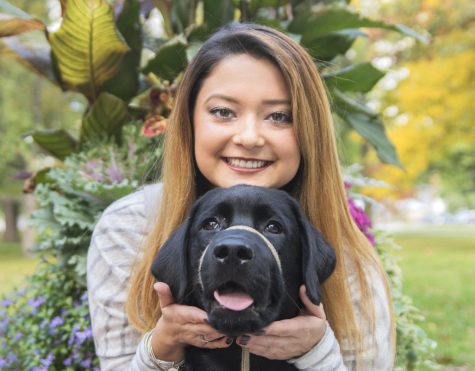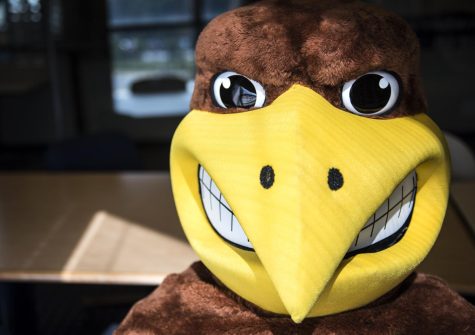Students bring Chinese New Year to Kent State
February 2, 2011
Video by Le Su.
The parties are over. The ball has dropped. The resolutions are broken.
That last one might be an unfair blanket statement, but the fact of the matter is, the New Year is now over a month old. Those who wish they could do it over again are out of luck until Sunday.
The American New Year came and went with Ke$ha’s lipstick at Times Square, but the Chinese New Year begins today, and will be celebrated on Sunday at Kent State.
For the second year, the Chinese Students and Scholars Association will host a Chinese New Year Festival for students of all backgrounds from 5 to 8 p.m. in the Student Center Ballroom on Sunday.
Look around. It is no surprise that Chinese students represent about 42 percent of the international students at Kent State, according to David Badagnani, adjunct professor of ethnomusicology.
With such a large number of students living so far from home, it means a lot CSSA President Xiangwen Li and fellow member Patrick Zhao to have this chance to bring Chinese New Year to Kent.
Both Li, a native of Guang Dong, China, and Zhao, of Suzhou, China, have attended Kent State for the past three years.
The two explained why Chinese New Year is such an important event and how they celebrate it differently at Kent State than they would at home.
“Chinese New Year is different here because we don’t have our family with us,” Zhao said. “What we can do is every one of us (Chinese students) gathers up, and we are a big family.”
This is one of the adjustments Chinese students have to make at Kent State in order to celebrate the New Year. In China, the New Year is a private time for family to gather together in celebration of the rebirth symbolized by the end of the old year and beginning of the new. Friends and others outside of the family are not invited to join in a family’s festivities, but at Kent State, the entire Chinese community becomes a family for the New Year.
The Chinese or Lunar New Year follows the lunar calendar, rather than a set calendar, so the date of the celebration changes every year. This year, while we celebrate at midnight on Feb. 3, it will be noon on Feb. 4 in China.
Like many Americans, the Chinese celebrate New Year’s Eve gathered around the television watching New Year’s specials with performances by the country’s most popular entertainers and eating traditional foods.
“We begin at 8 p.m. [and watch TV] until 2 a.m. the next day,” Li said. “We are sitting around family and cooking a big meal with a lot of dishes that we eat together and watch TV. Then at 12 p.m. we will boil dumplings to eat.”
Li explained that the way the dumplings are folded symbolizes the family getting together.
Today ushers in the start of 2011 in China. The People’s Republic of China formally adopted the Western calendar in 1949. Before that, it followed a different calendar established during the Qing Dynasty, which was about 500 years ahead of the western calendar. Thailand and some other Buddhist countries still follow the older calendar to this day, according to Badagnani.
Like the year, the Chinese zodiac also follows the western system. In the Zodiac, twelve different animals symbolize the rotation of the years. The Zodiac animals are ordered: rat, ox, tiger, rabbit, dragon, snake, horse, sheep, monkey, rooster, dog and boar.
“I don’t really know that whole method,” Zhao said, commenting on why the animals are arranged in this order. “Why don’t they put cat or something like that there? But these have been there for many thousands of years. It’s an old tradition.”
Zhao and Li explained that this year is the Year of the Rabbit. The rabbit symbolizes peace, quiet and modesty. The wish for 2011 is that people will rearrange their lives to be as mild as that of the rabbit so that they will not get into any trouble this year.
According to Li, an old traditional story is used to teach the order of the Zodiac. All of the animals had a race to see who would be first in the Zodiac. The gods would display the animals in the order that they finished the race. The ox was the strongest and fastest animal, so it reached the finish line first. However, the white rat was very clever and had jumped onto the ox’s nose early in the race. When the ox got to the finish line, the rat leapt from the ox’s head and landed over the finish line before the ox.
Li and Zhao hope that rabbits won’t be the only guests hopping by on Sunday for the Chinese New Year Festival.
“This time we want all Kent State students, not just Chinese,” Li said. “We try to prepare a performance with opera and American talk shows. We try to have something other cultures can understand.”
“Last year we found out that not a lot of locals had a good idea of what we were doing,” Zhao said. “So this year there are some components from western culture. Hopefully there is a fit for everyone.”
The Chinese New Year Festival offers a variety of performances from live music to dancing and an American-style dating show, which Li said is the anticipated highlight of the evening.
Badagnani’s orchestra, the Cleveland Chinese Music Ensemble is also part of the featured entertainment.
The Ensemble, founded in 2008, performs traditional Chinese music around the Cleveland area. Badagnani began playing Western classical music in high school, but was drawn to Chinese classical music and Asian culture while attending Florida State University as an undergrad. He came to Kent State for grad school because of the unique Chinese music courses the university offered at the time.
At Kent State, Badagnani learned to play the sheng, a bamboo ancestor of the harmonica, which he plays in the Cleveland Ensemble.
During the Ensemble’s performance, three traditional Chinese dishes will be served, along with American food for shy taste buds.
“Some Americans may like Chinese food, but some Chinese like American food, so we try to feed everybody,” Li said.
Dining services will be preparing the food, but Zhao has been working as an overseer to make sure the food is as authentic as possible.
The Festival has even earned the attention of the Chinese Embassy.
The CSSA sends frequent reports to the Embassy to let them know about important events within the organization.
This year, according to Li, the Festival is especially important because it is presented with the help of the Taiwanese student organization. China and Taiwan are notorious for political turmoil and conflict between their opposing governments. The Chinese Embassy has encouraged its students to work with their Taiwanese classmates in order to form a bond between the two countries.
Badagnani said this will be the first combined event for both Chinese and Taiwanese students. In previous years, Taiwanese students celebrated the New Year with their own separate activities.
“We are trying to cooperate with Taiwanese students to make sure that there will be no gap between us,” Zhao said. “Basically, what we are trying to do is not just for political reasons, but also for entertainment.”
Li added that a chorus assembled from both Chinese and Taiwanese students will perform at the Festival.
“All of us have New Year,” Li said. “Same day, same time. So we will have one chorus.”
Contact Amy Cooknick at [email protected].























